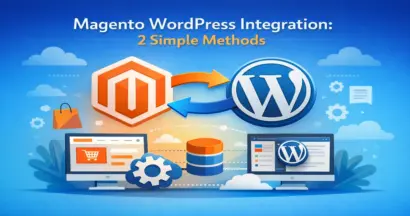Choosing between Magento vs WordPress for your online store is a bit like choosing between a specialized tool and a multi-purpose one.
Magento is built from the ground up for eCommerce, offering robust features and scalability for growing businesses. WordPress, while incredibly versatile, requires plugins to transform into a full-fledged online store.
This article will explore the key differences, from ease of use to SEO performance, empowering you to select the best fit for your unique needs.
Claue – Clean and Minimal Magento Theme
We provide an amazing Magento theme with fast and responsive designs. Let’s find out!
What is Magento?

Magento, now known as Adobe Commerce, is a robust, open-source eCommerce platform renowned for its scalability and flexibility. It is purpose-built for online stores, offering a comprehensive suite of features to handle complex product catalogs, manage inventory, process payments, and deliver personalized shopping experiences.
Magento’s modular architecture enables extensive customization, allowing businesses to tailor their online stores to precise specifications. It’s a popular choice for large enterprises and businesses with ambitious growth plans, thanks to its ability to handle high traffic volumes and complex business requirements.
What is WordPress?
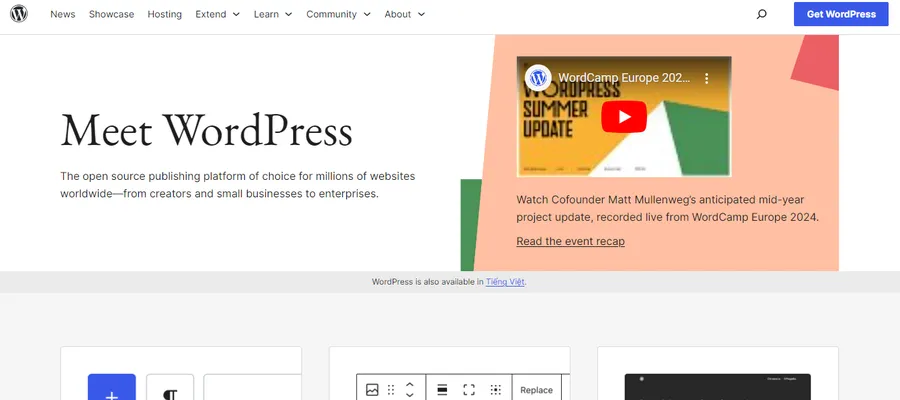
WordPress is a versatile, open-source content management system (CMS) that powers a significant portion of the internet. Initially designed for blogging, WordPress has evolved into a platform capable of building virtually any type of website, including online stores. With the help of plugins like WooCommerce, WordPress transforms into a capable eCommerce solution.
Its user-friendly interface and vast ecosystem of themes and plugins make it an attractive choice for individuals and businesses seeking a simple and cost-effective way to establish an online presence. WordPress’s strength lies in its content management capabilities and flexibility, making it ideal for content-rich websites and smaller online stores.
Magento vs WordPress: Key Differences
Magento vs WordPress: Ease of Use and Customization
While both platforms support core eCommerce features like products, shopping carts, and order history, they differ significantly in their ease of use and customization options.
- Magento: Built specifically for eCommerce, it shines in areas like multi-store management, advanced inventory handling, and customer segmentation, which are available out of the box. However, Magento’s reliance on the command line for updates and extension management can be daunting for non-technical users.
- WordPress: Known for its user-friendly interface, WordPress makes tasks like application updates and plugin management simple through its admin panel. However, to enable eCommerce functionality, you’ll need to install a WordPress plugin like WooCommerce. While WooCommerce is highly customizable, it might lack some advanced features compared to Magento.
Magento vs WordPress: eCommerce Development
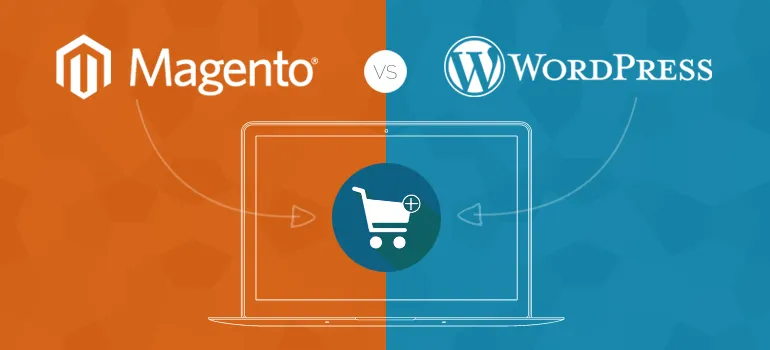
From a development perspective, the two platforms present different challenges and opportunities.
- Magento: Offers a powerful eCommerce platform with enterprise-level capabilities. However, its development environment is generally more complex and requires a steeper learning curve for those new to the platform. Tasks like theme creation involve a more programmatic approach, which might be less intuitive for developers accustomed to WordPress’s flexibility.
- WordPress: Known for its flexibility and extensibility, WordPress is a favorite among developers for its ease of customization and the abundance of pre-built solutions and tutorials available. However, setting up a full-fledged eCommerce store with WordPress might require more upfront effort compared to Magento.
Magento vs WordPress: Pricing
Both Magento and WordPress offer open-source versions, but their paid editions and hosting costs differ considerably:
- Magento:
- Magento Open Source: Free to use but requires separate hosting, which can range from $50 to $500+ per month depending on store size and traffic.
- Adobe Commerce: The paid version with advanced features and cloud hosting, starting at $25,000 annually based on GMV and AOV.
- WordPress:
- WordPress.org: The free, self-hosted version, requiring separate hosting that can vary from $5 to $500+ per month based on needs.
- WordPress.com: Managed SaaS version with plans ranging from Personal to eCommerce, the latter enabling online stores at $70 per month ($45 annually).
- WordPress VIP: Enterprise solution with premium hosting and features, starting at $25,000 per year.
Magento vs WordPress: SEO and Marketing
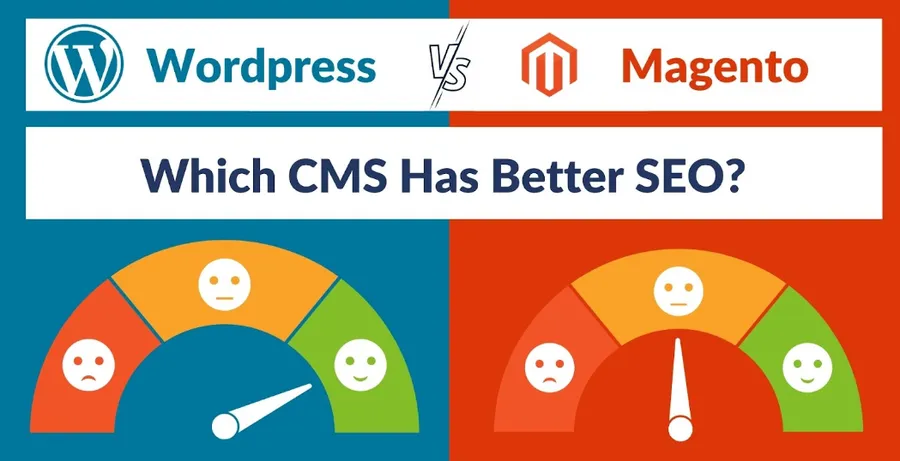
Search Engine Optimization (SEO) is vital for organic traffic and discoverability. Both platforms offer unique approaches to SEO:
- Magento: A robust eCommerce platform, Magento provides built-in SEO tools for optimizing product pages, categories, and metadata. Features like structured data markup, metadata customization, URL rewrites, and canonical tag support help stores achieve better visibility on search engines.
- WordPress: While WordPress offers basic SEO functionalities like auto-generated sitemaps, customizable URL structures, and XML-RPC pings, it lacks some essential eCommerce SEO features out of the box. However, with plugins like Yoast SEO and All in One SEO Pack, WordPress can be significantly enhanced for eCommerce SEO.
Magento vs WordPress: Security

Both platforms are popular targets for hackers, but their approaches to security differ.
- Magento: Implements a multi-layered security approach right from its core architecture. It boasts secure coding practices, built-in two-factor authentication, and granular admin security settings. Adobe’s free security scan tool further enhances protection against malware.
- WordPress: Adopts a simpler security model with features like user access control, secure password generation, and basic XSS/CSRF protection. Its vast plugin ecosystem allows for additional security enhancements, but it requires careful selection and management of plugins.
Magento vs WordPress: Hosting
While both Magento and WordPress offer versatile hosting options, their distinct technical demands lead to nuanced differences.
- Magento: Due to its complex codebase and software dependencies, Magento demands more resources, making it a bit trickier and often pricier to host. You have various hosting options like shared, dedicated, or VPS, each with managed and unmanaged choices. Managed Magento hosting, while more expensive, simplifies server management and optimizes performance, ideal for those without technical expertise.
- WordPress: Known for its lighter codebase and fewer dependencies, WordPress is easier and cheaper to host. Options like Amazon Lightsail VPS offer affordability but require technical skills for server maintenance. Managed WordPress hosting provides convenience and 24/7 support, though at a higher cost.
Magento vs WordPress: Plugins and Extensions
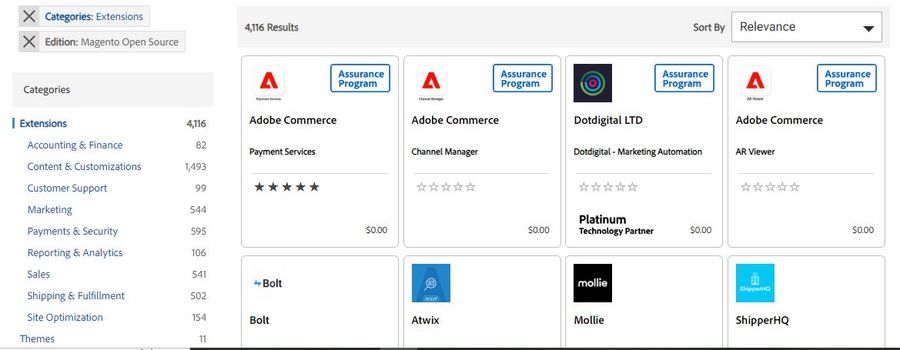
Both Magento and WordPress boast large ecosystems of plugins and extensions that enhance core functionality.
- Magento: Offers nearly 3,500 Magento extensions on its official marketplace, all vetted by Adobe. Thousands of free and paid third-party extensions are also available. However, installing a Magento extension requires technical expertise due to the command-line process.
- WordPress: Has a significantly larger pool of over 60,000 free WordPress plugins and nearly 800 paid WooCommerce extensions. The user-friendly installation process from the admin panel is a big plus. However, it’s crucial to vet plugins carefully to avoid performance and security issues, which outdated plugins can cause.
Magento vs WordPress: Themes and Templates
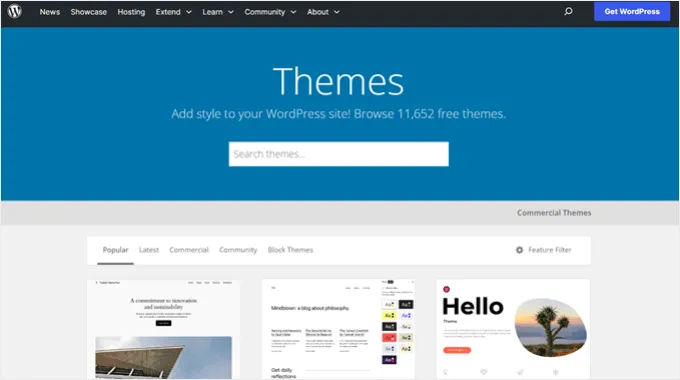
While WordPress dominates in terms of numbers, Magento offers advanced frontend capabilities.
- Magento: Provides a smaller selection of Magento themes on its marketplace, but there are hundreds available on third-party sites. The PWA Studio project empowers developers to build progressive web applications, and robust APIs facilitate the creation of headless websites. This makes Magento suitable for advanced eCommerce needs.
- WordPress: Offers exceptional design flexibility with over 10,000 free themes and 60+ paid WordPress WooCommerce themes. Additionally, thousands of third-party templates are available. The intuitive block-based editing workflow allows for code-free design and is fully extensible with plugins and custom blocks.
Magento vs WordPress: Which is the Best?
Choosing between Magento and WordPress for your online store depends on your priorities. Magento, built specifically for eCommerce, excels at handling large, complex stores with its powerful features and scalability.
WordPress, although requiring plugins for eCommerce functionality, is more user-friendly and adaptable for content-rich websites and smaller stores. Consider factors like budget, technical expertise, desired features, and future growth plans to make the best choice for your business.
Conclusion
Choosing between Magento and WordPress hinges on your specific needs and priorities. Magento, with its robust eCommerce features, is ideal for large or complex online stores where scalability and advanced functionalities are paramount. WordPress, coupled with WooCommerce, offers flexibility, ease of use, and a vast ecosystem, making it suitable for various store sizes and budgets.
Read more: What is Managed Magento Hosting? (5+ Best Providers)
Contact US | ThimPress:
Website: https://thimpress.com/
Fanpage: https://www.facebook.com/ThimPress
YouTube: https://www.youtube.com/c/ThimPressDesign
Twitter (X): https://x.com/thimpress_com


